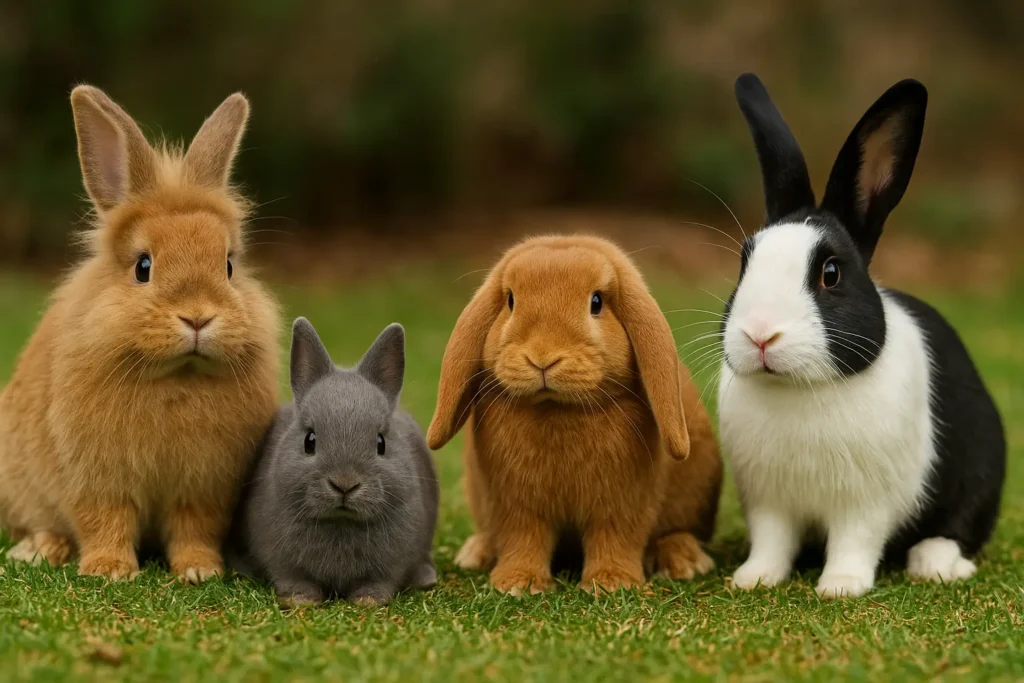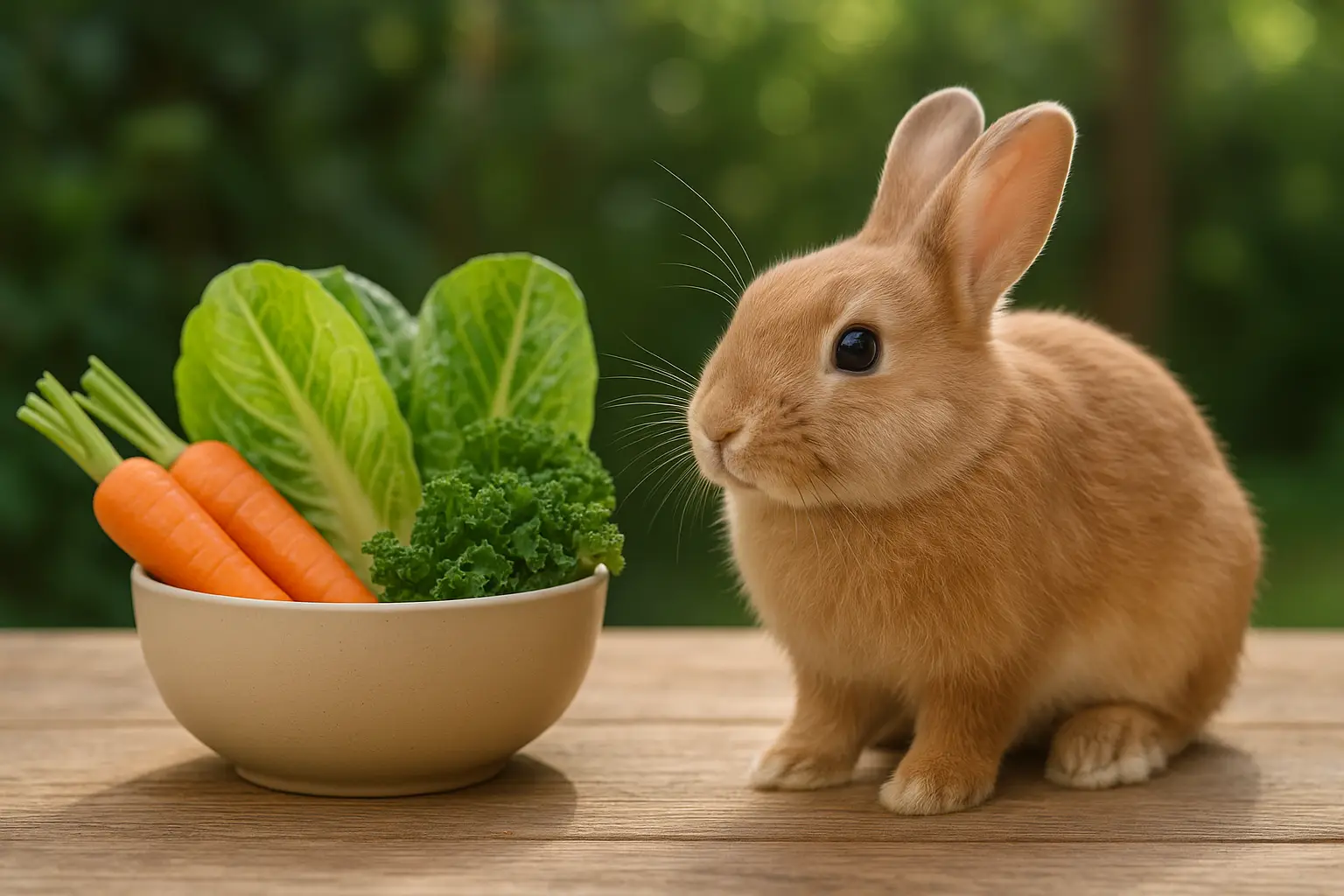Rabbit Breeds: Discover the Main Types and How to Choose the Ideal One

Table of Contents
Why Choosing the Right Rabbit Breed Matters
When choosing a rabbit as a pet, many people focus only on appearance. But knowing the different rabbit breeds is essential to make the right decision. Each breed has unique traits — some are more energetic, others more affectionate; some require grooming, others are low maintenance.
Choosing the ideal breed ensures a better match with your lifestyle and avoids future frustration. It’s like adopting a pet that truly fits your routine, energy level, and available space.
Understanding rabbit breeds helps you know what to expect in terms of behavior, size, care, and even lifespan.
Small Rabbit Breeds
Netherland Dwarf
The smallest of all domestic rabbits. The Netherland Dwarf weighs around 1kg and features large eyes, a rounded head, and short ears. It’s agile, curious, and needs a safe space to explore.
Mini Lop
Very popular in Brazil, the Mini Lop is known for its floppy ears and sweet nature. It weighs between 1.5 and 2.5kg and is perfect for those wanting a cuddly, affectionate companion.
Lionhead (Mini Lion)
Recognizable for the mane-like fur around its head. Besides its striking appearance, it’s a loving breed that enjoys interaction. Requires frequent brushing.
Also learn how long rabbits live and what affects their longevityMedium Rabbit Breeds
Rex Rabbit
Famous for its short, velvety fur. The Rex weighs between 2.5 and 4kg and has a calm, balanced temperament. It’s great for those looking for easy coat care.
Fuzzy Lop
Adorable with its fluffy coat, the Fuzzy Lop requires regular grooming. It’s affectionate and playful, but sometimes a bit stubborn. Weight ranges from 2 to 3kg.
English Angora
Known for its long fur covering even its face. Needs intensive grooming and trimming. Calm by nature, ideal for dedicated and patient owners.
Check out our full guide on domestic rabbits and proper careLarge Rabbit Breeds
Flemish Giant
Undoubtedly one of the most impressive rabbit breeds. The Flemish Giant weighs between 6 and 10kg. It’s calm and sociable — ideal for spacious homes. Despite its size, it’s typically very gentle.
However, due to its size, it requires special care: large enclosures, extra food, and regular vet check-ups.
French Lop
Similar to the Mini Lop, but much larger. Weighs between 5 and 6kg and has long, floppy ears. Very friendly and great with kids and other pets. Needs room to roam.
Checkered Giant
White fur with black spots — a strong, active breed. Weighs between 5 and 6kg and loves to explore. Best suited for experienced owners with outdoor space.
Large rabbits need space, but are often wonderful companions due to their calm and manageable nature.
How to Choose the Best Breed for You
With so many rabbit breeds out there, it’s natural to wonder: which one is right for me? Consider these key factors when choosing:
- Available space: larger rabbits need bigger areas to live and play.
- Time for care: long-haired breeds require regular grooming.
- Pet experience: more energetic breeds may be challenging for beginners.
- Kids at home: go for gentler, tolerant breeds.
- Budget: larger and long-haired rabbits cost more to feed and maintain.
Regardless of breed, every rabbit needs:
- Unlimited hay and quality pellets
- Clean, fresh water daily
- A safe, enriched environment
- Regular vet visits
Choosing the right breed is not just about preference — it’s about ensuring well-being and a lasting, happy relationship.
Lesser-Known Rabbit Breeds
Besides the popular ones, there are other breeds gaining attention in Brazil:
- Holland Lop: a smaller version of the Mini Lop, very sweet-natured.
- Tan: shiny coat and athletic build; highly active.
- Silver Marten: exotic look with dark fur and silver accents.
- English Spot: white with symmetrical black markings, great with kids.
These breeds are harder to find but make excellent pets for those looking for something unique and are willing to seek responsible breeders.
Also check out the Chinese hamster and other small petsBehavior by Rabbit Breed
While every rabbit is unique, breed traits often influence temperament. Knowing this helps you find a companion that fits your lifestyle.
Small Breeds
Breeds like Netherland Dwarf and Mini Lop are often energetic and playful. They need stimulating environments with toys, tunnels, and supervised exploration time.
Medium Breeds
Rex and Fuzzy Lop offer a balance between energy and calmness. Great for families and apartments, especially with a consistent routine.
Large Breeds
Flemish Giant and French Lop tend to be laid-back and relaxed. Though they need more room, they’re ideal for those seeking a calm, easygoing pet.
The bigger the rabbit, the more space it needs — but many large breeds are surprisingly gentle and peaceful.
Special Care by Rabbit Type
Certain rabbit breeds need extra care with their fur, diet, or health. Here’s what to know:
Long-Haired Rabbits (Lionhead, Angora)
- Daily brushing to prevent mats and hairballs
- Clean environment to avoid dirty fur
- Extra hygiene around the eyes and nose
Lop-Eared Rabbits (Lop, Fuzzy Lop)
- Check ears regularly to avoid infections
- Keep ears dry and well-ventilated
- High-quality hay to support digestion
Short-Haired Rabbits (Rex, Tan)
- Gentle brushing once a week
- Comfortable temperatures — short fur offers less insulation
- Balanced diet for shiny, healthy coat
All rabbits also need spacious, clean environments, fiber-rich diets, and regular vet care.
See our essential care tips for rodentsIdeal Environment for Each Breed
A rabbit’s living space directly impacts its well-being. Here’s a guide to the ideal setup:
- Small breeds: apartments with supervision and pens
- Medium breeds: indoor spaces with daily free-roam time
- Large breeds: safe outdoor areas or dedicated indoor rooms
Regardless of breed, all rabbits need:
- Non-slip flooring
- Access to hay and water at all times
- Dry, ventilated space with no drafts
- Enrichment with toys and chewable items
A well-adapted space, consistent routine, and interaction make all the difference in your rabbit’s life.Also see small dog breeds for apartments
Where to Find Responsible Rabbit Breeders
Finding a responsible breeder ensures your rabbit arrives healthy, social, and well-cared for. A good breeder prioritizes animal welfare, cleanliness, and provides full guidance to new owners.
When searching for rabbit breeds, check:
- Clean facility and spacious enclosures
- Healthy appearance (shiny coat, clean eyes)
- Clear information about the breed
- Health history or pedigree
- Post-adoption support
Avoid buying from fairs, generic pet shops, or ultra-cheap ads — these often signal neglect or irresponsible breeding.
Choose breeders who prioritize animal welfare and socialization to avoid future health or behavioral issues.
How Much Do Rabbits Cost by Breed?
Prices for rabbit breeds vary based on popularity, location, and care needs. Here are average prices in Brazil:
- Netherland Dwarf: R$ 200 to R$ 500
- Mini Lop: R$ 150 to R$ 400
- Lionhead: R$ 250 to R$ 600
- Rex: R$ 200 to R$ 500
- Fuzzy Lop: R$ 300 to R$ 600
- English Angora: R$ 350 to R$ 800
- Flemish Giant: R$ 500 to R$ 1,200
Don’t forget to include costs for cage, feeder, water dispenser, food, hay, toys, and vet care.
See also ideal dog breeds for small living spacesResponsible Rabbit Adoption: A Beautiful Alternative
If you want a pet but don’t mind the breed, consider adopting. Many rabbits are waiting in shelters and NGOs for a loving home. Most are mixed breeds but just as full of personality.
To adopt responsibly:
- Look for wildlife NGOs or rabbit-specific rescue groups
- Check if the rabbit is healthy and vet-checked
- Be ready to offer love and care
Rabbit adoption is still rare in Brazil, but it can change the animal’s life — and yours too.See also our suggestions for cute small dogs to adopt
Practical Summary: Choosing Between Rabbit Breeds
To find the best rabbit breed for your home and lifestyle, remember:
- Small space? Choose smaller breeds like Mini Lop or Netherland Dwarf
- Want a calmer pet? Larger breeds like Flemish Giant are perfect
- Enjoy grooming? Go with Angora or Lionhead
- Prefer easy care? Rex is low maintenance and very gentle
- Tight budget? Consider adoption or more common breeds
All breeds need:
- Unlimited hay and balanced pellets
- Clean, safe, and stimulating environment
- Vet care from an exotic animal specialist
- Daily interaction with their human
Choosing the right rabbit breed ensures better health for your pet — and peace of mind for you.
Helpful Links to Support Your Decision
- How long do rabbits live?
- Ideal food for rabbits
- Complete rabbit care guide
- How to build the ideal environment for small pets
To learn more about rabbit breeds and behavior, visit the article from Cães e Gatos Pet Center, a trusted Brazilian resource on animal care.


Post Comment